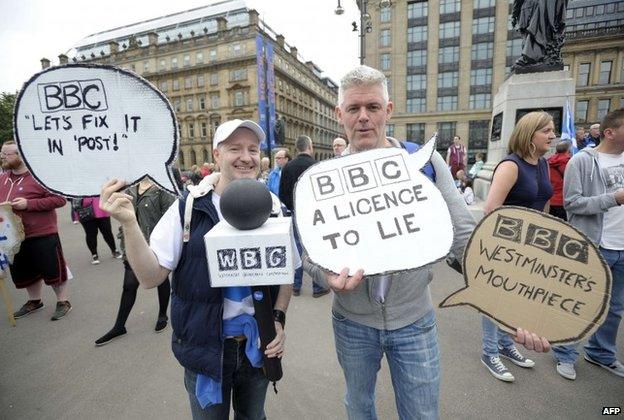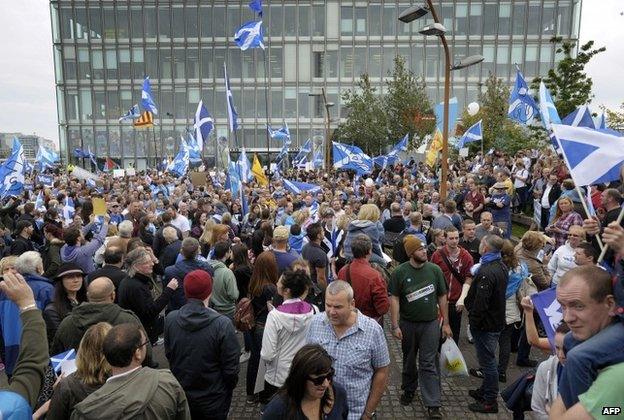Scottish independence: NUJ calls for end to journalist intimidation
- Published

Protesters have claimed BBC coverage of the debate on Scotland's future is biased against independence
The National Union of Journalists has called for an end to the bullying and intimidation of its members covering the independence debate.
The NUJ called on campaigners to rein in abuse, external, much of which it said was fuelled by anonymous attacks on social media against individuals.
The organisation also said there was a particular issue with intimidation of BBC journalists.
Both sides of the campaign have condemned abuse in all its forms.
The comments from the NUJ, three days before the referendum, came the day after a large crowd of protesters gathered outside BBC Scotland's Glasgow HQ, claiming the corporation's coverage had been biased against independence.
Protesters draped a banner over the entrance to the building calling for the BBC's political editor Nick Robinson to be sacked, after a clash with First Minister Alex Salmond at a media conference earlier last week.
The NUJ also said it had experienced a number of Labour MPs accusing BBC journalists of political bias against the pro-Union Better Together campaign.
The NUJ said it had already advised several of its members on making complaints to the police and vowed to "name and shame" those who continued to threaten or bully journalists.
And the union also called on the leadership of the campaigns for and against independence to consider the implications of accusing journalists of bias when they were simply asking challenging questions.
Weekend 'abuse'
NUJ Scottish organiser Paul Holleran said: "People have the right to protest if they believe strongly about an issue, however protesters outside the BBC offices in Glasgow this weekend have demanded that journalists be sacked, for allegedly being biased in favour of the Union.
"Journalists in Edinburgh and Aberdeen were abused over the weekend when simply turning up to report on events organised by both sides.
"Others were on the receiving end of a range of abuse and intolerance on social media, some of which has been logged and may be reported to the police."
Blair Jenkins, chief executive of the Yes Scotland campaign for independence, said of the BBC protest: "I don't think there was anything that happened here yesterday that caused anyone serious concern."
On the Nick Robinson banner, he added: "I would rather people didn't produce banners like that, but it is a free country and people are allowed to express an opinion."

Protesters gathered outside BBC Scotland's headquarters at the weekend
Mr Jenkins, a former BBC Scotland head of news, said he had experienced intimidation as a journalist, adding: "Most journalists in this building (BBC Scotland) and everywhere else would regard yesterday as very, very low on the Richter Scale - it was a perfectly civil protest by people who were expressing a point of view."
Blair McDougall, the campaign director for Better Together, which is backing a "No" vote, said of the protest: "There was an enormous banner, with a picture of a BBC journalist's face on it calling him a liar and calling him corrupt.
"There was a line of police protecting the BBC building from a crowd of people demonstrating on behalf of the government party in Scotland. Is that the sort of country we want to live in?"
Mr McDougall added: "We have real concerns about the BBC coverage, we have often very furious rows behind the scenes, but we don't make it public as we are not in the business of intimidating journalists and we have got to be clear that is exactly what that demonstration was designed to do."
A BBC spokesperson said: "We believe our coverage has been fair and impartial and has adhered fully to the requirements of our Editorial and Referendum Guidelines."